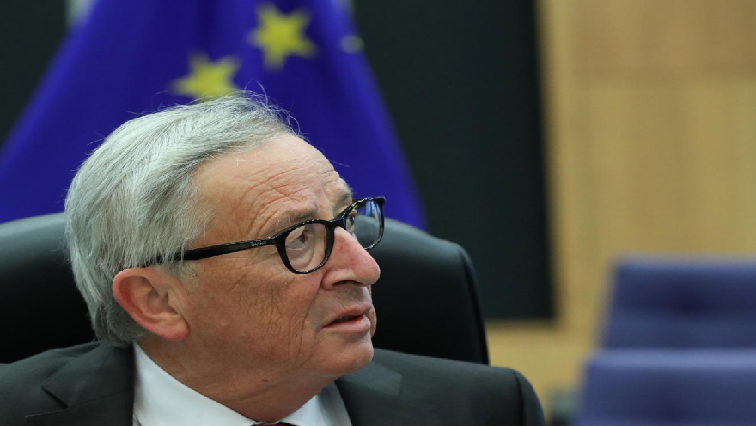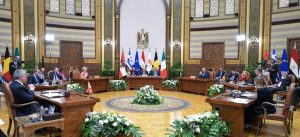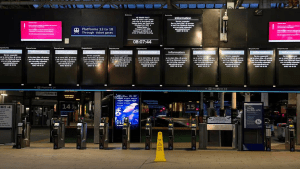European Commission President Jean-Claude Juncker said Britain and the European Union agreed a new Brexit deal.
“Where there is a will, there is a deal – we have one! It’s a fair and balanced agreement for the EU and the UK and it is testament to our commitment to find solutions. I recommend that (EU summit) endorses this deal,” Juncker said.
British Prime Minister Boris Johnson said: “We have a great new deal that takes back control.”
Further details about the deal are still to follow.
Prime Minister Boris Johnson’s last-ditch attempt to clinch a Brexit deal was thrown into disarray hours before a European Union summit on Thursday when the Northern Irish party he needs to help ratify any agreement refused to support it.
Johnson had set his hopes on convincing EU leaders to seal a divorce agreement at the summit, followed by a vote at an extraordinary session of the British parliament on Saturday, to pave the way for an orderly departure on Oct. 31.
Negotiators worked through several nights to agree a draft compromise on the Irish border issue, the most difficult part of Brexit, haggling over everything from customs checks to the thorny issue of consent from the Northern Irish administration.
But the Democratic Unionist Party (DUP), which supports Johnson’s government, said the text was not acceptable – a step that could spur hardline Brexiteers in his own Conservative party also to oppose ratification unless he secures additional changes.
“As things stand, we could not support what is being suggested on customs and consent issues, and there is a lack of clarity on VAT (value-added tax),” DUP leader Arlene Foster and deputy leader Nigel Dodds said in a statement.
“We will continue to work with the Government to try and get a sensible deal that works for Northern Ireland and protects the economic and constitutional integrity of the United Kingdom.”
A senior EU official said the legal text of an agreement had still not been presented and that, if one was not ready by the time leaders met at 3 p.m. (1300 GMT), they would then discuss a delay to Brexit. Even if a deal is struck, it may not be possible to complete ratification by the Oct. 31 deadline.
“We can still wait. So we are waiting,” said the official, who declined to be named.
The European Commission said it wanted a deal while German Chancellor Angela Merkel said one was still possible. Merkel said more work was needed on Northern Ireland customs and that, if necessary, EU leaders could meet again to discuss Brexit.
ALL TO PLAY FOR
Two weeks before the latest date for the United Kingdom’s departure from the world’s largest trading bloc, the possible outcomes still range from an orderly departure to a chaotic exit or even another referendum that could reverse the entire endeavor.
It is unclear what Brexit will ultimately mean for the United Kingdom and the European project – built on the ruins of World War Two as a way to integrate economic power and thus end centuries of European bloodshed.
Johnson, who was the face of the campaign to leave the EU in Britain’s 2016 referendum, has repeatedly said he will not ask for a delay – even though parliament has passed a law to oblige him to do just that if it has not agreed and ratified a deal by Saturday.
Johnson has no majority in the 650-seat parliament, and in practice needs 320 votes to get a deal ratified this Saturday – in what will be the first Saturday session since the Argentine invasion of the Falkland Islands in 1982. The DUP have 10 votes.
To further complicate matters, Johnson wants to call a snap election, but needs opposition backing to do so.
Sterling, which generally falls in line with prospects of a smooth, negotiated exit, was down 0.4% on the day against the U.S. dollar at $1.2784.
Officials in Brussels said almost all the differences between the world’s fifth-largest economy and its biggest trading bloc had been resolved after marathon talks that extended into the early hours of Thursday. A UK government source said the system of levying value-added tax remained an outstanding issue.
SEEKING APPROVAL
EU leaders will need to see the text of any agreement to allow them to give some form of approval.
But the British parliament, which defeated similar deals struck by Johnson’s predecessor Theresa May three times, may present an even higher hurdle.
Johnson won the top job by pledging to renegotiate May’s agreement, though he is reviving the bulk of it now, with changes to the protocol on how to treat the border between EU member Ireland and the British province of Northern Ireland.
The conundrum was how to prevent the frontier becoming a backdoor into the EU’s single market without erecting checkpoints that could undermine the 1998 Good Friday Agreement – which ended decades of conflict in the province.
Unionists such as the DUP – who profess loyalty to the union of Northern Ireland and Britain – fear that the EU’s proposals would divide the United Kingdom and trap Northern Ireland in the bloc’s orbit for years to come.
Johnson had assured the EU that, after May’s three defeats, he could get a deal approved in the British parliament. Lawmakers in the opposition Labour Party said they had been told to vote for another referendum on Saturday.
European Commission President Jean-Claude Juncker spoke to Johnson ahead of the summit. “We want a deal,” the Commission’s chief spokeswoman said.
Merkel told the lower house of the German parliament: “There has been movement in recent days, significant movement … so we are on a better path than before …
“I cannot say today how the European Council will end tomorrow. But I can say that we will not allow hatred and violence to flare up on the island of Ireland again.”






